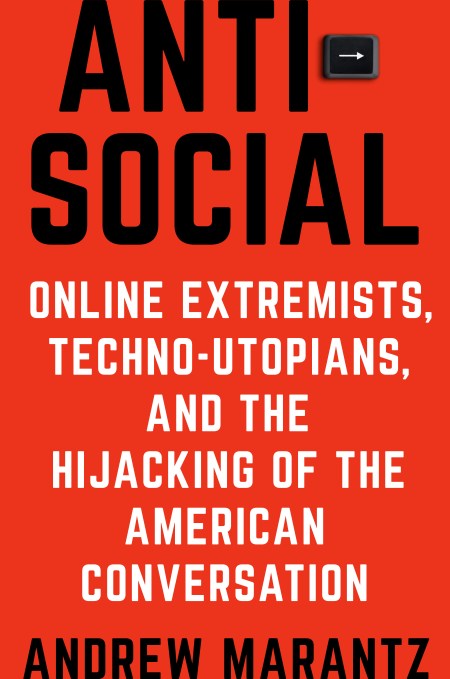When Elizabeth Warren took on Mark Zuckerberg and Facebook earlier this week, it was a low moment for what New Yorker writer Andrew Marantz calls “techno-utopianism.”
That the progressive, populist Massachusetts Senator and leading Democratic Presidential candidate wants to #BreakUpBigTech is not surprising. But Warren’s choice to spotlight regulating and trust-busting Facebook was nonetheless noteworthy, because of what it represents on a philosophical level. Warren, along with like-minded political leaders, social activists, and tech critics, has begun to offer the first massively popular alternative to the massively popular wave of aggressive optimism and “genius” ambition that characterized tech culture for the past decade or two.
“No,” Warren and others seem to say, “your vision is not necessarily making the world a better place.” This is a major buzzkill for tech leaders who have made (positive) world-changing their number one calling card — more than profits, popularity, skyscrapers like San Francisco’s striking Salesforce Tower, or any other measure.
Enter Marantz, a longtime New Yorker staff writer and Brooklyn, N.Y. resident who has recently trained his attention on tech culture, following around iconic figures on both sides of what he sees as the divide of our time — not between tech greats whose successes make us all better and those who would stop them, but between the alternative figures on the “new right” and the self-understood liberals of Silicon Valley who, according to Marantz, have both contributed to “hijacking the American conversation.”
Marantz’s first book, “Antisocial: Online Extremists, Techno-Utopians, and the Hijacking of the American Conversation,” will be released next week, and I recently had a chance to talk with him for this series the ethics of technology.
Greg Epstein: Congratulations on your absolutely fascinating new book Antisocial, and on everything you’ve been up to.
Your writing, to me, has evolved to the point where you’re now one of our best writers. You’ve become one of those writers where you take on a subject, and suddenly everyone needs to read about it.
Andrew Marantz: I appreciate that.
Epstein: You’ve written about almost everything I’m interested in. Except for maybe a few obscure topics, like, I’m a theology nerd —
Marantz: I was a religious studies major in college, so hopefully we can check that box at some point.
Epstein: Tell me more.
Marantz: I went to Brown, which means that there were very few requirements for things I actually had to study to get a religion degree. I essentially almost graduated without having taken a single course on Christianity, and then just decided to rectify that myself. I mostly studied Hinduism and Buddhism, and philosophy of religion.
You can see little traces of [those things] in the book. If I didn’t have to worry about boring readers, I probably would have delved into philosophy and epistemology more, because at its core, a lot of it’s about how beliefs are formed, and what beliefs are, and why people hold them, or abandon them, or how solid they really are to begin with. I tried to get at that just through reporting and narrative, but you need the philosophical underpinning to really get to the root of it.
Epstein: We’ll talk about some of the philosophy and epistemology in this conversation; I love that many tech readers are actually interested in those issues. I want to talk to you about your about to be released book, and the twin pieces you’ve just published for the New Yorker in the run-up to your book. The first was called “Silicon Valley’s Crisis of Conscience,” and the second was “The Dark Side of Techno-Utopianism.”
To start with the book; it covers such a range of characteristics and topics. It is in part a love letter to important thinkers like Richard Rorty and James Baldwin, and an important and timely commentary on Martin Luther King, Jr.’s idea that “the arc of the moral universe is long, but it bends towards justice.” But the book is also an HBO-style dramedy featuring all sorts of more and less unsavory characters. How would you summarize what it’s about?
Marantz: Great question, because as you say, there’s no simple way to talk about it. The simplest way I’ve found is to say it’s a book about how the Internet broke America. Obviously that’s incredibly reductive.
The more complex and therefore more honest way of talking about it is to say that it’s about a confluence of factors that nobody fully foresaw having to do with Silicon Valley’s early days of recklessness, ambition, greed, and idealism, and how that unwittingly set the stage for the rise of the alt-right, the election of Trump, and of other strongmen around the world, and the degradation of our entire informational ecosystem, which is a civilization crisis that we’re going to keep living with for long after Trump is gone.
It’s about how blindness and good intentions and happy-go-lucky trial and error can lead to an overwhelming crisis that we haven’t even really started to understand, much less figure out how to deal with.
Epstein: The dangerous combination of blindness and good intentions comes up a lot in the work I’ve been doing at TechCrunch writing about ethics in technology.
While the book is about both tech and what you could very broadly call the alt-right, it spends more time in terms of pages on these alt-right leaders of various stripes, like Mike Cernovich, and Richard Spencer. They certainly rose to prominence thanks to the internet, but are not generally associated with Silicon Valley the minds of most people familiar with them.
How do you see the connection between these sorts of shadowy but incredibly influential figures in contemporary American politics, and Silicon Valley and this thing we call tech?
Marantz: First to just explain why the book spends more time with what I call the gatecrashers than what it does with what I call the new gatekeepers, which is the Silicon Valley folks: there’s a dumb and pedestrian logistical reason for it, which is that they’re the ones who let me spend more time with them. When I started reporting the book, [the big tech companies] weren’t giving any access to any journalists at all. They were completely controlling their message, as tight-lipped as the CIA.
As I kept reporting the book, obviously this crisis unfolded in real-time, they started going into crisis PR mode, and they started letting journalists in, including me. I did have the access I needed on both fronts by the end.
The reason I foregrounded the alt-light and alt-right and the deplorables et al. — I struggled a lot with whether to give them a platform, whether I was being duped into amplifying their propaganda…[whether I should do that] was the central question of my life for a long time. The reason I ultimately decided to feature them, albeit extremely critically and skeptically and in a really limited fashion, was because I think we can’t understand the crisis we’re in unless we understand the manipulators and the propagandists and the trolls, and how they’re using these tools.
It’s one thing to talk about it in theory, and to say, “Hypothetically, how could these systems be misused?” It’s another thing to actually sit and watch people as they abuse these systems, and just look over their shoulder and explain exactly how to do it, and why they’re doing it. I felt that that was such a valuable resource for us to know as a society that I was willing to, frankly at great cost to my psyche, spend a lot of time with these people.
Epstein: I agree with you on that perspective. I’ve also spent a lot of time watching these people, reading about them, researching them.
Not as much time speaking with them and spending time with them as you have, though, so I found what you did extremely valuable. It would be one thing if you took these alt-right and alt-light figures and you were making some kind of MTV-style video about them, or TikToks of them or whatever.
Marantz: Right. [I’m not] glorifying them, putting them on the cover of Rolling Stone, that kind of thing.
Epstein: No, you’re helping people who are the opposite of the alt-right, who would be unlikely to understand these figures intuitively, a chance to really sit with them, get to know them, and think about what it is that they’re doing and advocating for. It’s great.
Marantz: The “why are you giving them a platform?” critique is definitely not one I dismiss out of hand. It’s one I’m frankly obsessed with. After a lot of internal deliberation, I came down where I came down, but it’s worth wrestling with. [There were] many people and stories and incidents and episodes I decided not to amplify for various reasons.
To also get to your original question, I think this is a really effective way of blowing open the closed-minded, willfully naïve idealism that has become the ethos of Silicon Valley. The most effective way to disprove that is just to show a quote-unquote “use case,” to use their lingo, that directly contradicts their ideology.
In other words, if Silicon Valley is going to keep telling itself the story that the only uses of their technology will be the most optimistic, the most hopeful, the most salubrious, the most prosocial, you can try to rebut that logically, or you can just disprove it by showing a very glaring counterexample. If somebody is going around and saying, “all swans are white,” you can argue against that logically, or you can just show them a black swan.
Rather than arguing, although I do make a lot of arguments with the Silicon Valley ethos in the book, I felt like the shortest, most efficient way to do it would be to just show how people, in fact, use their technology, which is not the way they would have originally wanted it to be used.
Epstein: You have this great moment in the early part of the book where you’re unexpectedly hanging out with Peter Thiel at the DeploraBall. It’s quite a scene.
He’s there, not really talking to you, but he’s not not talking to you. You ask him if he wants to hear your counterintuitive theory, or as he put it in his book Zero to One, which you’d read carefully, your “important truth” on which very few people agree with you?
Marantz: Mm-hmm.
Epstein: He doesn’t stop you, so you tell him your “truth,” which to paraphrase you is that the relationship between popularity and quality, or in the case of the Internet, virality and quality is tenuous at best.
Marantz: Tenuous at best, and maybe there’s no relationship at all.
Epstein: Right. It’s not that something of quality can’t be popular.
Marantz: Right. If there’s no relationship at all, it doesn’t mean that they’re inversely correlated. It just means they’re not correlated. Certainly, if there is a positive correlation, it’s not one to one.
Epstein: Which comes across as all the more ironic, or depressing, in your sections on Emerson Spartz, an internet entrepreneur who called himself, aspirationally, the “Viral Guy.”
You spent a lot of time with him, because he’s really lived, breathed, absorbed, and emanated the philosophy of the early stages of Google, Facebook, Twitter, Reddit, and others, which is that virality is king.
Funny — as the word “virality” rolled off my tongue, it sounded like “virility.”
Marantz: They’re not unrelated.
Epstein: Virality and virility, I like that juxtaposition. But ultimately, that major prophecy of the early social Internet era, of which Emerson Spartz almost desperately wanted to be a prophet, is that the purpose or meaning of life is to go viral.
Marantz: Yep. If Silicon Valley is a religion or an ethos, Emerson Spartz is one of the most eager acolytes you can find.
Again, these beliefs don’t happen in a vacuum. They condition certain actions and structures and behaviors, and they shape our economy and our society.
If you go around preaching that the best stuff is going to spread, and the cream is naturally going to rise to the top, and therefore we can just liberate and demolish old systems, and throw out everything that’s been done before, and not even think about what we’re going to do to replace it because it’s all going to take care of itself…
If you spread that ethos because it’s convenient to you, and it lets you off the hook, and allows you to make a lot of money, and be on the cover of magazines without having to do the hard work of thinking through how you’re actually reshaping society, then you’re not only doing your own convenient PR. You’re also conditioning the behaviors and beliefs of a whole generation of people who are going to follow in your footsteps.
If you’re Mark Zuckerberg saying, “I am the great liberator. I am the great toppler of gatekeepers, and everything I do after this point will be liberatory and helpful to society just automatically on its own.”
First of all, you’re wrong. Second of all, it’s shocking that people believed you for as long as they did. Third of all, maybe he realized it, maybe he didn’t, but you are grooming a new generation of Emerson Spartzes to come along and follow in your footsteps in these really corroded, degraded ways.
Epstein: There really are multiple products of this ‘ideology of virality.’ Do you have a name for it, by the way?
Marantz: The ethos of virality, the axiom of virality wouldn’t be a bad name. I actually didn’t have to coin many phrases, because these guys often just did it for me. I believe at one point, Spartz [said] something like, “Our barometer is, if it’s shared, it’s quality.” That’s him telling me what the ethos is. I didn’t have to make anything up because I just quoted him.
Epstein: This ethos also shows up a lot in your writing about Reddit. You depict them as starting out with this philosophical concept of the “tabula rasa,” the blank slate.
It’s like they started with a blank slate of whatever content people wanted to throw up online, and just saw where it went in terms of people’s preferences. At one point they even tried this big exercise where they started users off with a blank screen and let people form crowds online to decide what its content should be.
Marantz: [Reddit used] literally a pixelated tabula rasa.
I guess the closest I come to giving it a name would be techno-utopianism, in the sense that I chose that instead of techno-optimism or techno-chauvinism, because I think it truly is a utopian ideology. [Some people are] optimistic about what technology can do, or hopeful, or bullish on technology. I think they literally believe either tacitly or overtly or cynically or whatever it was, that their technology would usher in a utopia, and that’s an extremely dangerous thing to believe.
Epstein: For those who haven’t academically studied the history of the idea of utopianism, it’s just this idea that things are going to get better and better and better, and they’re going to be perfect. When you’re talking about techno-utopianism, how much is what you have in mind similar to or different from that popular idea?
Marantz: The original source for utopianism is Thomas Moore, [but] I don’t think that’s what these guys are thinking about. I don’t want to put concepts in their brains that wouldn’t be there.
What they would be thinking about is not something they would have learned in a class, because a lot of these guys didn’t finish college. Even when they were there, they weren’t very interested in reading literature and philosophy.
It was more this thing that would have seeped into their brains through cultural osmosis, that all technology has ever been is a force for liberation. All centralized power is bad. All distribution of power is inherently good.
These are not notions that you can really formally argue for very long before they break down, but I don’t think they’ve spent much time formally arguing for them. In fairness to them, they were never asked to, because never ever really put pressure on their arguments.
Everybody just accepted them, because the Arab Spring was happening, and Obama was coming to power, and everything just seemed like it was naturally working out. They just accepted those tacit arguments. It was extremely rare that they were ever asked to even clarify their beliefs, much less that those beliefs were challenged.
Epstein: They ended up believing things that were extremely convenient for them to believe.
Marantz: As most of us do. Most subcultures have what Richard Rorty would call a dominant vocabulary. This isn’t only true of tech bros. It’s also true of New York journalists and professors and whatever. Plumbers.
Everybody has a way of thinking, and generally those ways of thinking are convenient or concordant with the way that they already want to live their lives. That maxim, ‘it’s hard to get someone to believe something if their salary depends on it.’ I’m butchering the Upton Sinclair quote.
That applies to everyone, not just Silicon Valley people. It’s just that most people don’t have that much unchecked power. In every other industry, there are either formal regulations or informal norms pushing back against the way people would prefer to live.
They don’t have enough resources to fulfill their vision, or the government is checking their ability to do it, or society is checking their ability to do it. Silicon Valley is really the only case I can think of where none of those restraints were in place.
Epstein: Why do you think that is, by the way? How do you explain the idea that this group of people was able to achieve so much power so quickly?
Marantz: I think it was a confluence of easily available capital, great skill and ingenuity, being in the right place at the right time. I think they also got lucky for a while that there were no obvious glaring counterexamples showing that what they were doing was dangerous. When I originally planned to write this book — I went through different stages during 2015 and 2016 — for most of that time, I was the obnoxious guy at the Brooklyn dinner party, saying, “I’ll bet you that Trump is going to win.”
Which made me unpopular. Then I had the consensus beat into me such that by late October of 2016, my plan was, “Okay, I’m going to write a book about how we dodged a bullet, and how even though Trump didn’t get elected, that was way too close a call.”
Then in November 2016, I said, “Oh, shit, we’ve been hit by the bullet. I‘ve got to write this book really fast.” The reason I bring that up is that I think if that hadn’t happened, and if Duterte hadn’t happened, and [Italian populist leader Mateo] Salvini hadn’t happened, and Bolsonaro hadn’t happened, and Brexit hadn’t happened, and blah, blah, blah.
You can go on down the list — then we would have gone another ten years without these guys getting called on their bullshit.
Keep an eye out for Part 2, where Greg and Andrew discuss the Alt-Right and White Nationalists in tech and politics; Silicon Valley spirituality today; competing philosophies of tech ethics; and more.



